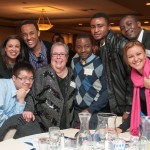Over the past 10 years it’s become clear that the work to increase the public high school graduation rates and lower drop-out rates has had an impact, as 80% of students from the high school class of 2012 earned their diploma as the US Dept. of Education reported in their April 2014 report. However, these improvements have not translated to college success for students from low-income households. For almost 40 years the college graduation rate for low-income students has remained flat at about 20%.
Bottom Line has been squarely focused on the issues of college access and success for low-income students for almost twenty years. We know that the solution to improving the college success rate for low-income students won’t come easily. We are pleased to see more attention being paid to the disparity between the “Rich and the Poor”, as in this week’s Wall Street Journal article, Big Gap in College Graduation Rates for Rich and Poor, and the recent study, Indicators of Higher Education Equity in the United States published by the University of Pennsylvania and the Pell Institute for Study of Opportunity in Higher Education.
As with the improvement of the national public high school graduation rates, the factors that relate to college success are complex. There is no quick fix or low-cost intervention that will solve the problem. However, we have identified one key differentiator that we believe leads to long-term college success and that is the importance of having an experienced family member, mentor or counselor to whom students can turn to when faced with a challenge.
Through nearly two decades of work supporting students through college, we have learned that virtually all of the challenges faced by low-income college students fall in to four categories: Academics, Career Development, Affordability, and Social/Emotional. Our DEAL Model for college success is built around this framework. When students are faced with challenges from one or more of these categories, they need a trusted resource to provide guidance, and a strategy as they work to overcome the challenges they face. Bottom Line can be that resource for some or many of those students, but we need a national investment of time, talent and resources to help.
Questions? Thoughts? Share them with us here!



